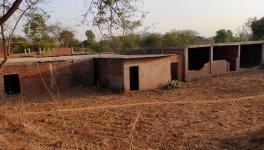Chhattisgarh Anti-mining Protests: Consent of Gram Sabhas Faked Under Pressure From Adani Group
Chhattisgarh's Hasdeo Aranya, spanning an area over 1,700 square kilometres is currently witnessing fierce anti-mining protests against the state government and the Adani group. The protests have been on in 20 villages since the past one week.
The region is home to adivasis and other traditional forest dwellers, who are dependent on the forest for their livelihood and sustenance. Due to the essential features of this rich area, the Ministry of Environment, Forest and Climate Change (MoEFCC) declared the entire region as a ‘no-go area’ for mining in the year 2009. On June 23, 2011, the then Union Minister for MoEFCC Jairam Ramesh granted forest clearances to 3 coal blocks—Tara, Parsa East and Kante Basan, but promised that no further clearance would be given to any other coal mining projects in this region. Even this forest clearance was later set aside by the National Green Tribunal following Section 2 of the Forest (Conservation) Act 1980 for diversion of 1,898.328 hectares of forest land at Parsa East and Kante-Basan captive coal blocks in favour of Rajasthan Rajya Vidyut Utpadan Nigam Ltd, being managed by the Adani group.
An environmental clearance has been given for the block at Parsa where mining work has also taken off. The residents allege that all land acquisition norms were flouted to provide clearance for the plant. Speaking to NewsClick, Alok from the Hasdeo Aranya Bachao Sangharsh Samiti, said, “The environmental clearance for this project was cancelled by the National Green Tribunal in 2014. However, there was a stay order that was put in place by the Supreme Court which led to the continuation of the mining processes. The Parsa coal block was also given an environmental clearance 3-4 months ago.”
Also read: Tribals of Niyamgiri Asked to Leave Villages on the Pretext of PM’s Awaas Yojana
Explaining how the norms were flouted, he said, “The previous process of land acquisition which was carried out during Raman Singh’s tenure was misinterpreted under the coal bearing act [Coal Bearing Areas (Acquisition and Development) Act, 1957]. The state government ignored the PESA (Panchayats (Extension to Scheduled Areas) Act 1996). This is flawed, as PESA empowers us to give consent for the land acquisition process. Even the land acquisition act (Right to Fair Compensation and Transparency in Land Acquisition, Rehabilitation and Resettlement Act, 2013) states that all acquisition processes must keep consent of the locals at the centre. Even the Forest Rights Act of 2006 validates this claim. However, all of this was ignored.”
He added, “Another major issue is with the environmental clearance. The process was on and the issue went to the Environment Impact Assessment Committee (EIA). The EIAC had asked specifically to put three conditions in front of the government, what will be the impact on the barrage and the elephant corridor and the land. Following this, consent of the Gram Sabhas was sought. However, under pressure from the Adani group, fake Gram Sabhas were conducted by the district administration.”
The protesting tribals have heavily criticised the negligence of the norms by the state government. In a letter, stating their demands, submitted to the Chief Minister on October 21, they wrote, “The auction/allotment of coal blocks is to be done by the Union government, but the state government is mandated to determine the procedures and lays down rules for forest and environment clearance and land acquisition.. The state machinery is also responsible and empowered to raise any objections in this matter. It is also imperative to ensure implementation of PESA 1996 and FRA 2006 before initiating processes for land acquisition and giving forest clearances, and record the (lack of) consent from Gram Sabhas. We urge the state government to consider these demands.”
The protesters have demanded the immediate scrapping of the land acquisition process undertaken in the villages of Salhi, Hariharpur and Fathepur in the Parsa coal block. They highlighted the need to secure written consent letters from Gram Sabhas for land acquisition for any project – as per the rules of the PESA, 1996. In the three villages of the proposed coal block, the acquisition process was carried out without securing the consent of concerned gram sabhas, which is a clear violation of PESA 1996 and Section 41(3) of the Right to Fair Compensation and Transparency in Land Acquisition, Rehabilitation and Resettlement Act, 2013. Hence, the land acquisition process should be readily cancelled.
Previously, after the 2015 Supreme Court order and the coal ordinance policy that had led to the new coal auction policy being drafted by the Modi government, 20 Gram Sabhas had protested against the mining activity. In the wake of this protest, anti-mining protests have gained momentum in the region.
*This is a developing story.
Get the latest reports & analysis with people's perspective on Protests, movements & deep analytical videos, discussions of the current affairs in your Telegram app. Subscribe to NewsClick's Telegram channel & get Real-Time updates on stories, as they get published on our website.
























